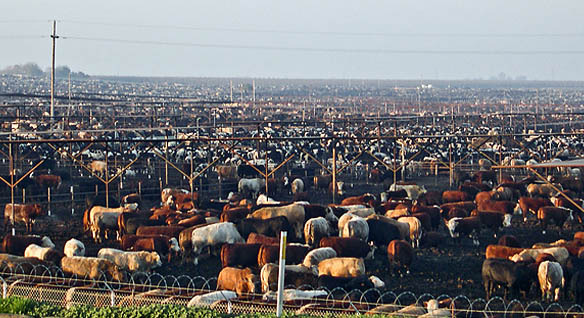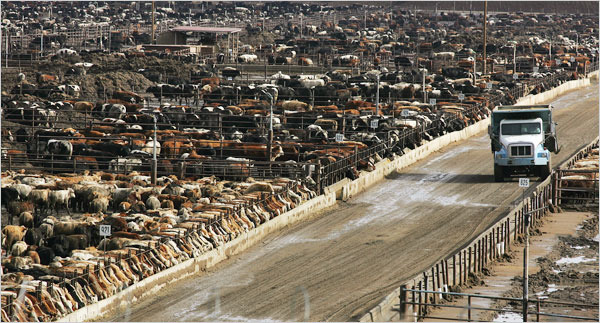As I travel across the country I’ve witnessed thousands upon thousands of animals (mostly cows) being raised to feed the beef demand in our country and around the world. We’ve taken small local animal farming from something that was sustainable and uncruel to something unsunstainable at the cost of animal lives and their welfare. Let me put it another way. We’ve created a demand so high that it has become impossible to fulfill this demand without animals living and dieing in atrocious ways.
In a NY Time article written in 2008 it states, “Americans eat about the same amount of meat as we have for some time, about eight ounces a day, roughly twice the global average. At about 5 percent of the world’s population, we “process” (that is, grow and kill) nearly 10 billion animals a year, more than 15 percent of the world’s total.”
http://www.nytimes.com/2008/01/27/weekinreview/27bittman.html
In order to ‘produce’ enough meat, the agriculture system has created ‘feed lots’ to rapidly grow and then kill thousands of head of cattle in a short period of time. Some feed lots hold up to 100,000 head of cattle. Yes, I said that correct 100,000. These animals are confined to small fenced pens, fed corn and soy based diets (not grass), and stand around in their own feces. Their diet and living conditions cause all sorts of issues so antiobiotics are regularly administered to them to keep them from dieing and getting other cattle sick. This is what we are supporting and feeding ourselves when we eat the majority of beef produced in this country.
I came upon my first ‘cattle feed lot’ in Kansas. Up to this point it was mostly cattle grazing on harsh desert scrub brush on open ranges. Even these animals although allowed to roam in larger areas are subjected to the harsh winters and hot summers of their landscapes with no cover. Nothing could prepare me for witnessing the feed lots. I’ve watched documentaries and undercover videos of feed lots and slaughter houses but even those didn’t prepare me for seeing the lives of these cows.
Here are a few pictures from feed lots in California and Oklahoma. I tried to get on a property in Kansas to take photos and was warded off by large warning signs at the entrance.
As I got closer and closer to Dodge City, Kansas, lot after lot after lot dotted the landscape. Thousands and thousands of animals. I was overwhelmed with sorrow and grief for these animals. The pain I felt for them was deep. The tears I shed were uncontrollable. Even reading all the signs, “such and such FEED LOT,” degraded these beings to nothing more than ‘feed.’
I arrived in Dodge City to spend the night after an almost 9 hour drive. When I got out of the car I almost threw up from the stench in the air. What is that smell I asked myself? It smelled like death, like blood, like dirty filthy living. It was a smell I never experienced before and never want to again. I learned quickly that the two largest meat slaughter houses and packing plants in the country are located in Dodge City. It all made sense. The smell matched the animal genocide that was occuring everyday, all day, in this part of the country to these cows.
To put it lightly I was heartbroken. I felt immobile with the pain and sadness not only for the animals but for us humans. How have we become so greedy and so out of balance with nature? How is it so easy for us to dismiss cruelty to animals because, well, we like steak? How come people can’t make the connections to us humans getting so sick by looking at what we are putting in our bodies?
The whole system is so out of whack and only a few really look at it, talk about it, and work towards changing it.
I was sitting with my couchsurfing.org host at dinner that evening and he was talking about how sick he was went he was in Korean markets. He said he couldn’t stand to see the dogs and cats skinned hanging to be bought. Or the cages with live dogs that you could pick to have killed and skinned for you on site to take home. He was appalled by this. Said he never wants to see it again. I tried to explain to him that when I saw the feed lots, I felt as he did in those markets in Korea. He basically said no way. That I would feel even worse if I saw dogs and cats. I couldn’t argue with him as I have never seen this, but I can tell you that the pain I felt for these cows surrounding us was great. It brought the question to the table, why do we value some animal life more than others? If we can understand the love and connection and spirits of our dogs and cats, why is it any different for cows? Are they really lesser?
This division in equality is dangerous. Very dangerous. What we do to animals is a reflection of what we do to ourselves and our own species. Slavery and genocide are some of the forms that are created out of this “superior mentality” that arises from making descions about somethings worth.
We do it to each other and we do it to the planet and all its inhabitants. It’s time for us to stop turning a blind eye to our choices. All of our choices have consequences. We individually and collectively are responsible for how we live with and use one another, the animals of the earth, and the planet itself.
If we want peace in our lives and hearts we have to make choices that don’t bring about harm. We need to stop operating from a place of, “it’s always been this way.” or “But I like it.” Our thoughts, words, and actions have real consequences on more than just our lives. If you can look at your dog and cat and love them wholeheartly, can you extend some of that love to the life of the beings you are choosing to eat? Can you choose a more sustainable, healthy, and cruelty-free way? Can you look at your excuses and find ways around them? There are many options and choices and all things are possible.
I’m compelled to give voices to these animals. None of this is easy. Change can be very difficult and painful at times. Truth can be something we want to hide from and ignore, but it will come back around time and time again until we look it in the eye and deal with it. Let’s start making a change for ourselves and for the enslaved animals. I appreciate you taking the time to read, think, and be open to different ideas. Let’s get the conversation started or keep it going. Let’s start taking action.


Thank you Rex.
I applaud you on your journey, writing, thoughtfulness and compassion. There’s no explanation but cognitive dissonance for the way people feel towards dogs, cats vs. cows, pigs. etc. It makes no sense.